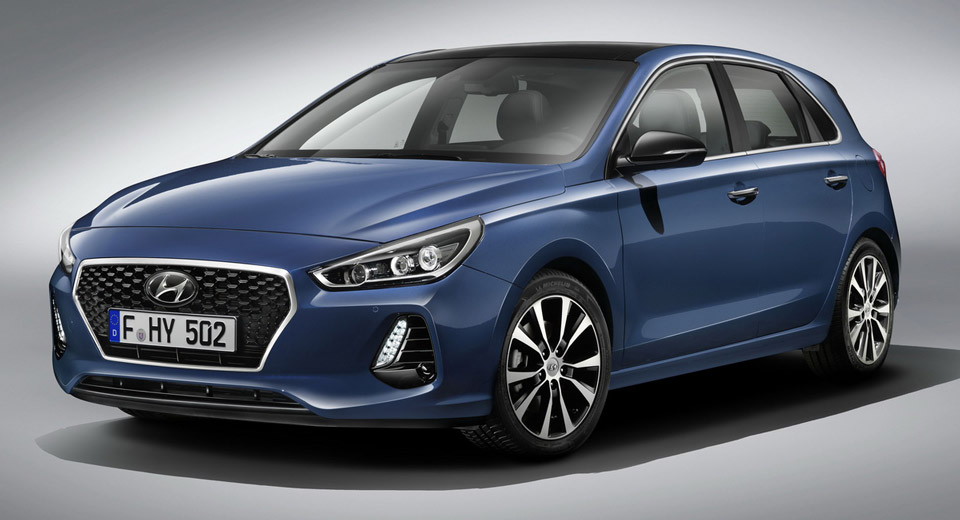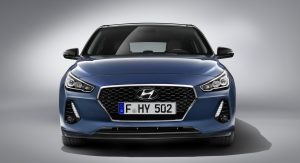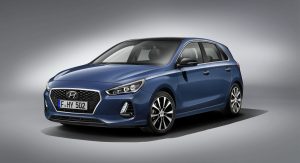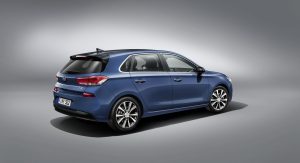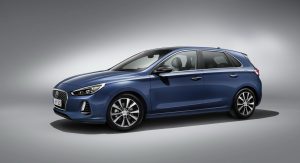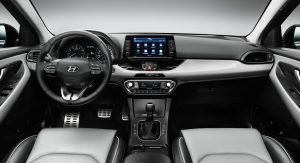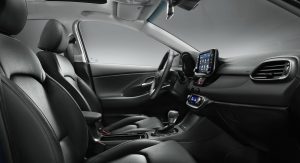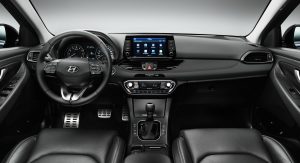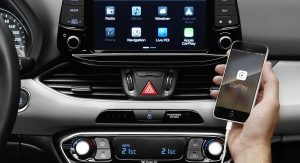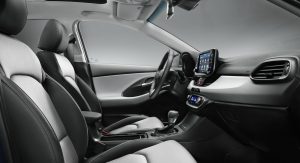Hyundai has officially pulled the covers off the third generation i30, in five-door hatchback form, prior to its world premiere scheduled for the 2016 Paris Auto Show, at the end of this month.
Set to become a complete family of vehicles, which will be eventually topped by the range-topping i30 N hot hatch, it features an entirely new look, with the ‘cascading grille’ sitting proudly at the front, waiting to be adopted by other Hyundai models in the future.
Designed, developed, tested, and manufactured in Europe, it spans at 4,340 mm in length, 1,795 mm in width and 1,455 mm in height, with a 2,650 mm wheelbase. This means that it is 40 mm longer, 15 mm wider and 15 mm shorter over its predecessor, with the wheelbase maintaining its dimensions. It offers a generous boot capacity of up to 395 liters, meaning 15 liters more over a similar Volkswagen Golf, which can increase up to 1,301 liters with the rear seats folded down.
Taking center stage inside, where the overall design has significantly moved away from the older model, is an optional 8-inch touchscreen, which integrates media, navigation, and connectivity features. It is compatible with Apple CarPlay and Android Auto and allows induction charging for smartphones. The overall interior is said to be class leading and the roominess feel is enhanced by an optional panoramic sunroof.
Other features that will be welcomed by consumers include the standard 5-inch capacitive LCD with touchscreen, integrated rearview camera, premium audio system, Bluetooth and My Music functionality, topped only by the aforementioned 8-inch display, 7-year free subscription to TomTom Live services and a redesigned 3-spoke multifunction steering wheel that can be optionally heated.
Taking on the Volkswagen Golf, Ford Focus, Renault Megane, Opel/Vauxhall Astra and other major players in the compact segment, the all-new Hyundai i30 brings the latest safety features, making it the brand’s sole car with the most advanced safety package. The list is long and includes: “Autonomous Emergency Braking with Front Collision Warning System, Smart Cruise Control, Blind Spot Detection, Rear Cross Traffic Alert, Lane Keeping Assist System, Speed Limit Information Function and High Beam Assist.”
Fresh to Hyundai’s lineup is the Driver Attention Alert, a feature that monitors driving patterns, helping detect fatigued or reckless driving and preventing potential accidents. The system analyses steering angle, torque, lane position, and driving time, and if it detects inattentive driving, then it will alert the driver through a sound and message on the instrument display.
The engine lineup includes three petrol and three diesel units and kicks off with the 1.4-liter MPI and its 100 PS (99 HP) & 134 Nm (99 lb-ft) of torque, followed by the 1.0-liter three-cylinder, which is rated at 120 PS (118 HP) and 170 Nm (125 lb-ft) of torque. The range-topping petrol is also a Hyundai-first: 1.4-liter T-GDI turbocharged four-cylinder, producing 140 PS (138 HP) and 242 Nm (178 lb-ft) of torque.
On the diesel side, there is a 1.6-liter DOHC 16-valve mill, available in three outputs: 95 PS (94 HP) & 280 Nm (207 lb-ft) of torque, 110 PS (108 HP) & 280 Nm (207 lb-ft) of torque and 136 PS (134 HP) with up to 300 Nm (221 lb-ft) of torque. The 1.4 MPI, 1.0 T-GDi, and entry-level diesel are available exclusively with a 6-speed manual gearbox, while the 1.4 T-GDi and the two range-topping diesels can be paired, optionally, to a 7-speed DCT.



